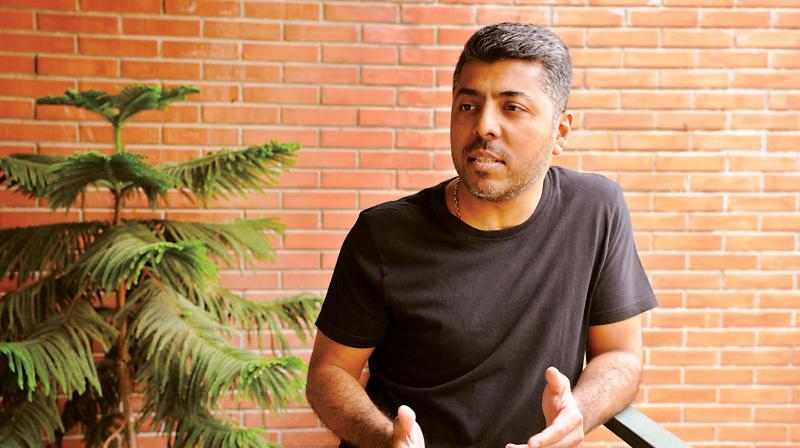The fire in the monochrome
\"Nothing worth having is easy. Nothing easy is worth having. Make of it what you will.\"

“If you threw me out into the world, with no explanation, and with everything stripped away - what in the world would I be," writes Haruki Murakami, in Men Without Women. Shibu Arakkal's upcoming show, Four, is a stripping down too, starting out with hyperrealistic landscapes colour palettes that are very unusual for Arakkal's trademark monochromatic flair. "I started there and moved towards a place where I was asking myself, 'what's the least a frame can contain to still be called a photograph?" This is a culmination, in a sense, of a philosophical journey that has lasted a lifetime, of choosing a path most people wouldn’t dare to tread.
"Nothing worth having is easy. Nothing easy is worth having. Make of it what you will." Arakkal settles into a corner of his living room, amidst the daily domestic bustle of a typical weekday evening, to articulate, almost gingerly, the processes behind his works. This must be said, for Arakkal is rarely given to intellectual banter - "If your work is different, you shouldn't have to say so. And if you do, then it isn't different enough. I don’t call myself an intellectual or agree with those who use it for its own sake."
With three days left before the curtains go up on Four, our conversation is peppered by interruptions as Arakkal handles one crisis after another deftly, the very picture of calm. It's a real-life manifestation of the somewhat perturbing quiet that seeps in through his work, which raises as many questions as it strives to answer. "It's not what you photograph, it's what you do with it -" He nods his affirmation to this remark. They reflect, by his own admission, a deeply sensitive, philosophical nature - he doesn't use form so much as toy with it, turning to blank skies when he is asked to look for a thunderstorm.
The series, which is made of three sets of four pictures each, began with a single photograph of the sky, the sea and a lone fisherman. The horizon, he noticed ran right through, leading him to wonder, “Can I split it evenly?” The horizon shifts through the course of the photographs – asymmetry is important, a manifestation, perhaps, of what Arakkal calls “a mercurial mind” embedded in a “deeply sensitive” heart.
It also marks his first solo show in five years, although it his third body of work in that span (Lines in the Sand and Pipe Dreams preceded Four) - "I put a lot into every body of work, that's why it takes so long," he remarks. That said, Arakkal does not prescribe to what he calls "Bohemian nonsense." "It's not about being prolific, work at your own pace, but I’m not the sort to sit around and wait for inspiration to hit you either. My father painted every day of his life, he never waited around for the right moment."
So what drives him? In 2007, Arakkal embarked on a very special series of photographs that had him meet with a number of Indian artists who were in exile, including M.F. Husain, whom he visited at his house in London and Shakti Burman. To each of these artists he posed one question: What's the first thing you do after you start your day? The answer was both unanimous and unsurprising - "They paint or sculpt or etch or do what it is they have to do," Arakkal explains. This was followed by another question: Why do you do this? Do you have to? Do you want to? Or do you need to? Again, they all came back with the same response - 'We need to'. "You're mentally and emotionally consumed by these questions - they're compulsive, they drive you, they don't let you sleep. Art becomes a physical necessity, you need to get this out of your system and get on with your day. At that point, you hardly stop to say, 'I will wait for inspiration'!"
It's an arduous journey but one through which he perseveres - "Anything else is escapism. My dad would always say, 'If it's tough, man up', and I try to. I've come to realise that this is my normal. Some things are more difficult than others, it doesn't mean they aren't worth fighting for. You have to go through the fire, you need to be burned a little."
What: Four
The show is a dedication to his late father, the internationally renowned artist, Yusuf Arakkal
When: September 4 to 24
Where: Gallery Time and Space, 55, Lavelle Road
